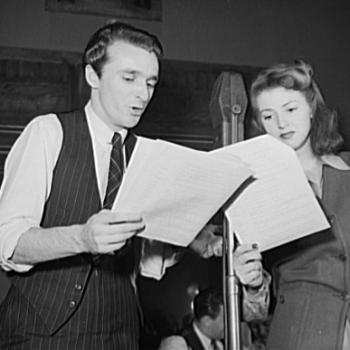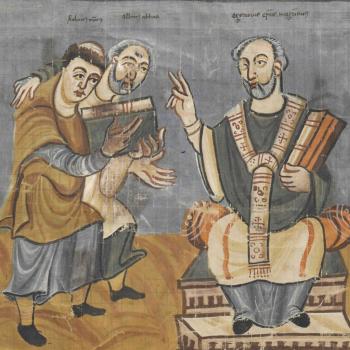On the anniversary of Pearl Harbor, I am thinking about a writer whose reputation has gone through astonishing shifts through the years, in large part because of the events of that December 7.
For much of the early and mid-twentieth century, Robinson Jeffers (1887-1962) had a stunning reputation. When Edward Abbey quoted Jeffers, he wouldn’t bother to name him, but he just called him The Poet, and literate people knew who he meant. Jeffers was the favorite poet of Charles Bukowski, and Gary Snyder and Ansel Adams were devotees. In the 1930s, Jeffers and T. S. Eliot were commonly ranked side by side as the great living American poets. In 1932, “the Whitman of Big Sur” was on the cover of Time Magazine.
Jeffers was a dazzlingly versatile author, some of whose finest writings really demand attention, and they would assuredly be much better known if they were in prose rather than verse. Besides a great many memorable shorter pieces, he turned out some very long verse narratives or epics, including Tamar, Cawdor, The Loving Shepherdess, and Give Your Heart to the Hawks. In effect, these are substantial novels in verse form, which can stand alongside any of the best American fiction of the 1920s or 1930s – particularly, in my view, Give Your Heart to the Hawks. In theme, if not in style, Jeffers often echoes his younger near-contemporaries, William Faulkner and Eugene O’Neill – for better or worse. In fact, the three together would make a wonderful subject for a joint critical biography.
Each Jeffers work in its way is deeply imbued with ideas from mythology, with a heavy dose of modern anthropology. Those writings contain a potent Gothic sensibility (to say the least), and the mysticism is pervasive. The Californian settings are gorgeous and memorable, suggesting Jeffers’s passionate environmentalist views.
The poems also demonstrate a profound familiarity with the Bible, and especially the Old Testament. That is scarcely surprising as Jeffers learned so much from his father, a Presbyterian professor of Old Testament Literature and Biblical History at Western Theological Seminary, in Pittsburgh (now merged into Pittsburgh Theological Seminary). We can trace far more Calvinism in Jeffers’s world-view than he might ever have cared to admit.
By 1940, Jeffers’s career was going magnificently, but his political commitments became increasingly contentious. Already in 1925, his Shine, Perishing Republic was a deeply pessimistic jeremiad against an America on the verge of rapid and inescapable decline, overcome by corruption, urbanism, and mass society. It begins
While this America settles in the mould of its vulgarity, heavily thickening
to empire
And protest, only a bubble in the molten mass, pops and sighs out, and the
mass hardens …
Note the “this America”: there would be others, and probably soon. In such a process, another war would be a terminal catastrophe, in driving the country to empire, over-ambition, and decay. In the 1930s, he was anti-interventionist, anti-imperialist, and radically isolationist. Adding to that concern was the fact of having two growing sons who would soon be of military age.
As such, he found himself increasingly at odds with FDR’s interventionist foreign policy, which he saw as a flat-out attempt to deceive the nation into another destructive war, on the lines of 1917. We can argue at length about the various conspiracy theorists about Pearl Harbor and whether FDR knew in advance about the attack – personally, I don’t believe them for a moment. But beyond argument, the administration was indeed working hard through 1941 to provoke a naval war in the North Atlantic, with a view to finding an excuse for an open declaration of war on Germany. And then Pearl Harbor happened. That was a war alright, but in the wrong ocean.
Jeffers was furious, disgusted, and contemptuous, and not long afterwards, he poured forth his wrath in the poem Pearl Harbor:
Here are the fireworks. The men who conspired
and labored
To embroil this republic in the wreck of Europe
have got their bargain—
And a bushel more ….
The war that we have carefully for years
Provoked
Catches us unprepared, amazed and indignant.
…
This is the
People
That hopes to impose on the whole planetary
world
An American peace.
When I teach courses on World War II, I sometimes offer those opening lines in an exam, followed by “Discuss.”
In 1943, his Historical Choice declared that
We were misguided
by fraud and fear, by our public fools, and a loved leader’s ambition
To meddle in the fever dreams of decaying Europe.
He counted FDR among the “pimps of death.”
To say the least, Jeffers was a very long way from the patriotic consensus that followed Pearl Harbor, and the fact that he was arguably right about the “conspired” and “provoked” offered him no protection. These and other lines thus gravely damaged his reputation, to the point of making him radioactive. When Pearl Harbor and other poems were collected in The Double Axe (1948), the appalled publisher added an extremely unusual disclaimer: “Random House feels compelled to go on record with its disagreement over some of the political views pronounced by the poet in this volume.” If the author had been anyone less prestigious than Jeffers, now a Grand Old Poet, they would have much preferred to refuse publication.
The main problem was that the US political spectrum had just shifted so fundamentally since 1941 or so. Before Pearl Harbor, isolationist and America First views were thoroughly respectable, and even mainstream: youthful supporters of the America First Committee included both John F. Kennedy and Gerald Ford. By 1948, in contrast, Jeffers’s poems made him sound something like a fascist diehard, which he assuredly was not. At a time when FDR had achieved a kind of secular sanctity, Jeffers seemed to be spouting blasphemy.
This affair certainly did not end his career, and his dramatic works enjoyed spectacular global success, especially his Medea. But if other poets and authors continued to adore him, his stock in the public market fell catastrophically. For decades, he was not taught in academe, and only recently has he regained popularity as a key Modernist.
That is how one of the great American writers dropped off the cultural map. As I have suggested, he still offers a very great deal for a modern reader. If nothing else, remember such provocative lines as
We shall beware of wild dogs in Europe, and of the police in armed imperial America.
Also recall his conclusion to New Mexican Mountain (1930), describing the tourists watching a Pueblo tribal ritual:
Apparently only myself and the strong
Tribal drum, and the rock-head of Taos mountain, remember that
civilization is a transient sickness.
Some other lines from Pearl Harbor have been in my mind recently as we have debated issues of immigration and birthright citizenship:
As for me, what can I do but
fly the national flag from the top of the tower?
America has neither race nor religion nor its own language: nation or nothing.
Jeffers was denying that the US was of its nature, or necessarily, White, or Christian, or English-speaking. Americans might speak lots of different languages or be of very diverse races and faiths, but if their loyalty is to the nation, that is it: they are Americans. Nation or Nothing. That’s all we’ve got, no distinctions.
Words to govern by.
















